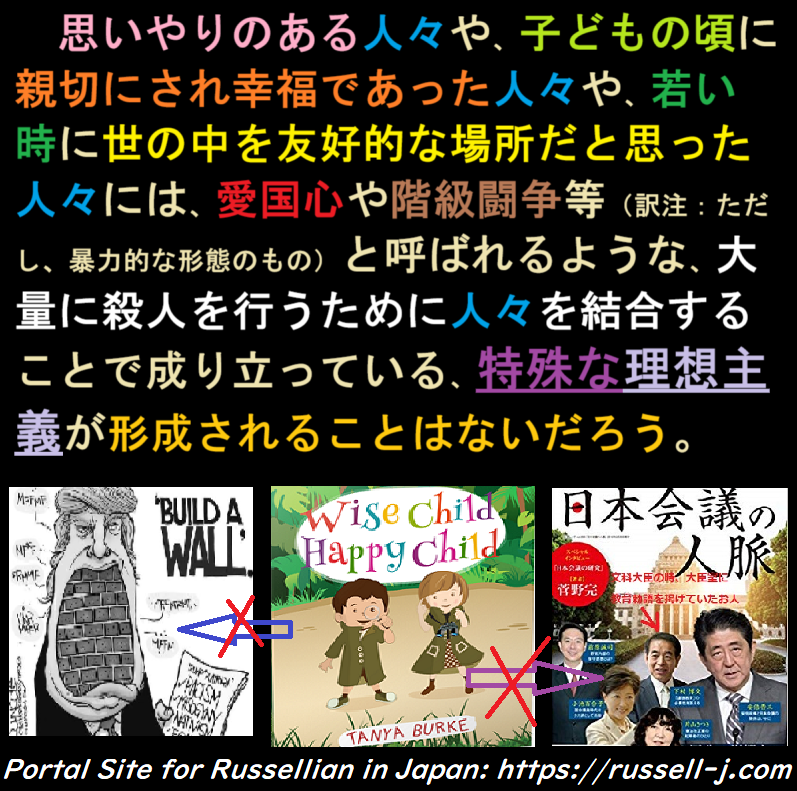
思いやりのある人々や、子どもの頃に親切にされ幸福であった人々や、若い時に世の中を友好的な場所だと思った人々には、愛国心や階級闘争等(訳注:ただし、暴力的な形態のもの)と呼ばれるような、大量に殺人を行うために人々を結合することで成り立っている、特殊な理想主義が形成されることはないだろう。
A kindly population, a population who in their childhood had received kindness and been made happy, and who in youth had found the world a friendly place, would not develop that particular sort of idealism called patriotism, or class-war, or what not, which consists in joining together to kill people in large numbers.
Source: Power, 1938.
More info.:https://russell-j.com/beginner/POWER18_310.HTM
<寸言>
権威主義的な国家(注:政治権力が少数の指導者や政党に集中し、民主的な制度が形式的に存在しているだけあるいは機能していない国)として、これまで 中国、ロシア、北朝鮮、イランなどがよく挙げられてきました。ところが、トランプ大統領(本年3月から再び米国大統領に就任)の政治手法により、最近、アメリカもまた権威主義的な傾向が強まっている国として見られることが増えてきました。
皮肉なことに、共産党一党独裁をとる中国が、アメリカの一国主義を批判しつつ、「角を隠して」 国際協調の重要性を世界に訴えるという逆転現象さえ見られます。
それにしても、トランプ大統領はどのような幼少期を過ごしたのでしょうか? 「本日のラッセルの言葉」に同意できる人なら、「子どもの頃に親切にされ幸福であった人々には、愛国心(ただし、暴力的な形態のもの)やそれに類する、他国民や他民族を威圧するような、特殊な理想主義が形成されることはない」と思うはずです。そうであれば、トランプ大統領の幼少期には、共感性の発達を阻害するような何らかの困難があったのかもしれません。
トランプ大統領は、米国第一主義のもと、MAGA(Make America Great Again)のスローガンのもと、各国を威圧し、有利な立場に自国(というより自分)をおいて「ディール(取引)」を呼びかけるというやり方ばかりとっています。対等の立場で関係国の間で調整するという意味での「ディール」であれば問題ないですが、論理的な議論や説得では勝てないという判断からでしょうか、常に自国よりも弱い相手国との「1対1の取引」に持ち込もうとします。
全ての国が米国との「1対1の取引」を回避し、多国間の枠組みで連携することができれば、トランプ大統領の態度を改めさせることができるはずです。しかし、それに成功している国はアメリカの最大の友好国のイギリスだけのようです。米国に追従してきた日本の政治家には荷が重いようであり、心配です。
Countries such as China, Russia, North Korea, and Iran have long been cited as examples of authoritarian regimes, where political power is concentrated in the hands of a small group of leaders or a single party, and democratic institutions either exist only in form or do not function in practice.
However, with President Trump having returned to office this March for his second term, the United States is now increasingly seen as exhibiting authoritarian tendencies as well, due to his style of governance.
Ironically, while China continues to maintain its one-party Communist rule, it has begun criticizing America's unilateralism and, while "hiding its sharp edges," has started advocating the importance of international cooperation, a reversal of roles that would have once seemed unthinkable.
This leads one to wonder: what kind of childhood did President Trump have?
Anyone who agrees with today's quote from Bertrand Russell would likely believe that *“those who were treated kindly and were happy as children do not tend to develop patriotic fervor, in its more violent forms, or related kinds of idealism that seek to dominate other nations or peoples.”*
If that is the case, then perhaps there was some hardship in Trump's early life that hindered the development of empathy.
Under the banner of "America First" and the slogan "Make America Great Again," President Trump consistently pressures other countries and frames negotiations as "deals" in which the U.S. (or more precisely, he himself) assumes the upper hand. If "deal" meant a fair agreement among equals, there would be little problem. But perhaps believing he cannot prevail through logic or persuasion, he always seeks to draw other nations, especially weaker ones, into one-on-one negotiations where he holds more power.
If every country were to avoid such bilateral deals and instead join forces within multilateral frameworks, it might be possible to change President Trump's approach. But so far, it seems only the United Kingdom, America's closest ally, has succeeded in doing so. For Japan, whose political leaders have long followed in America's footsteps, such a task appears to be too great, and that is cause for concern.